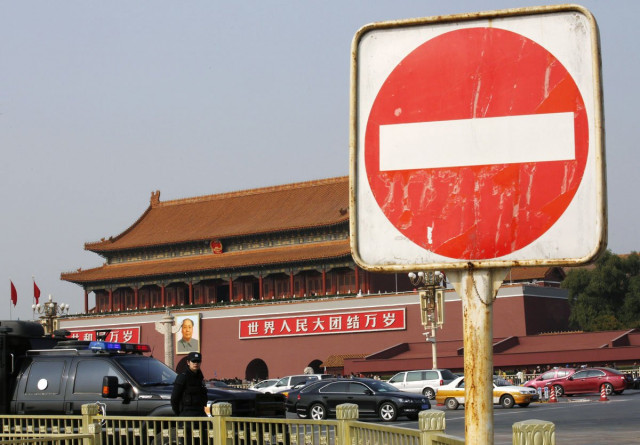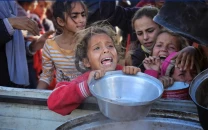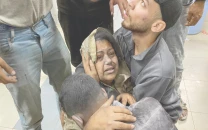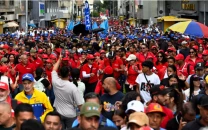China's Uighurs blame violence on abuses, not jihad
But residents reject accusation that deadly Tiananmen incident this year is result of terrorism.

A sign is seen next to a policeman of the Special Weapons and Tactics (SWAT) team standing guard in front of the giant portrait of Chinese late Chairman Mao Zedong, on Tiananmen Square in Beijing October 30, 2013. PHOTO: REUTERS
The dusty city of Hotan on the edge of the Taklamakan desert is 3,300 kilometres and a world away from Beijing's Forbidden City, the symbolic heart of Chinese power.
Armed security personnel in camouflage and police vans patrol the streets in the city whose two million strong population is 96 percent Uighur, a mainly Muslim ethnic minority concentrated in Xinjiang.
China's state broadcaster CCTV has said that the three people who carried out the Tiananmen attack, which saw their vehicle barrel into crowds and burst into flames, and five others detained in connection, were all from Hotan.
But residents reject the accusation that the deadly Tiananmen incident - the first attributed to Uighurs outside the far western region - and a series of clashes inside Xinjiang this year are the result of terrorism.
"Uighurs are angry that women are not allowed to cover their faces or that they must bribe government officials to get things done," said a 30-year-old doctor.
Like other interviewees he asked not to be named for fear of repercussions from discussing the sensitive topic.
"They don't go overseas" for terrorism training, he told AFP. "The problem is they are unhappy with officials in Hotan. The governance is bad and that's why these idiots do what they do - make trouble, turn to violence."
Several said they did not know if extremism or other factors motivated the Tiananmen attack, in which police said a man, his wife and his mother crashed into crowds on the square, killing two tourists, before setting their car on fire and dying in the blaze.
One pointed to the amateur nature of attacks as evidence the perpetrators could not have been organised or trained.
Security experts have also questioned Beijing's allegations that a militant group with cross-border links is actively fighting for an independent Xinjiang, while overseas rights groups accuse China of exaggerating the global jihad threat to justify oppressive measures.
Beijing says all countries are justified in cracking down on terrorism and insists it has promoted economic growth in the relatively less-developed region.
But in Hotan, Uighurs cite religious restrictions as a major grievance, particularly an official campaign to stop the Muslim practice of women covering their faces.
"This is where problems arise. They don't respect our ethnic traditions," said one resident, adding: "The people they call terrorists are just people who are uncivilised and uneducated... Anywhere you go you will find good guys and bad guys."
In Kashgar, 500 kilometres from Hotan, several residents said a clash with police that left 21 people dead in April erupted after a local official tried to force a woman to remove her veil.
At the time, the official news agency Xinhua labelled those involved as "terrorists" who "regularly watched video clips advocating religious extremism" and gathered together "to practise killing skills".
Another stand-off between locals and police turned violent in Hotan in June, although authorities did not specify the casualties.
Chinese state-run media described that incident as involving terrorists who sparked riots by "attacking a number of people with weapons after gathering at local religious venues".
But residents near the scene said crowds gathered after authorities temporarily shut a popular mosque, with protesters grabbing wooden rods from a construction site.
Soon after, several people said, authorities shut phone communications for several hours and Internet connections for many days. Police detained people without explanation, including mere passers-by, they added - a complaint voiced by others in Hotan.
Unknown numbers were still being held, said a 28-year-old man living near the mosque - a small concrete structure whose green double doors were still locked and where the open-air prayer area was filling with leaves.
"Why they were detained and why they have not been released, we don't know," he said. "Officials at the township level and below do whatever they want."
Another woman in Hotan said of the police: "If we Uighurs just say two words to them they come beat us. This is one of the issues."
City authorities could not be reached for comment.
Abuse by police and local government officials has fed resentment and triggered sporadic violence elsewhere in China - although authorities do not normally describe this as terrorism.
Last Wednesday a bomb outside a Communist party office in Taiyuan, capital of Shanxi province, killed one person and injured eight. Xinhua described the culprit as a 41-year-old ex-convict who sought to "take revenge on society".
At a carpet factory in Hotan, the manager said that attacks involving Uighurs were always reported as terrorism.
"It's better not to look into it or ask questions," he added. "Some of the police at the lower levels are uncivilised. That is why conflicts arise".



















COMMENTS
Comments are moderated and generally will be posted if they are on-topic and not abusive.
For more information, please see our Comments FAQ